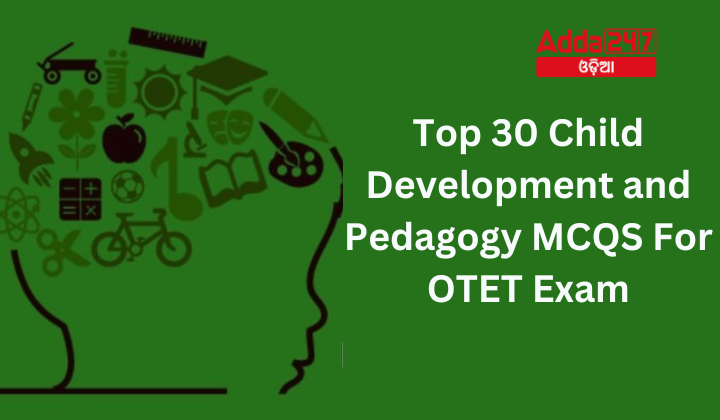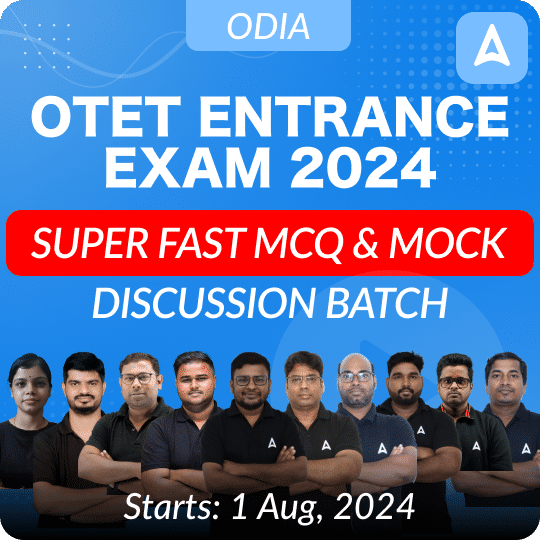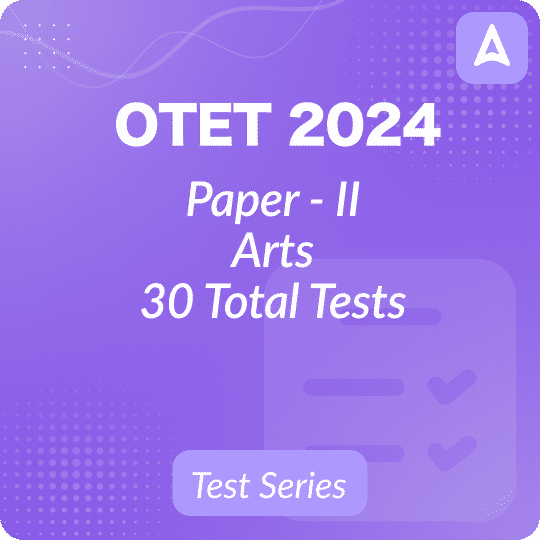The Odisha Teacher Eligibility Test (OTET) assesses the eligibility of candidates to teach in schools of Odisha. A crucial section of this exam is Child Development and Pedagogy, which evaluates understanding of child development and the principles of pedagogy. Below are 30 multiple-choice questions (MCQs) designed to help candidates prepare for this section.
Top 30 Child Development and Pedagogy MCQS For OTET Exam
- Rousseau advocated an educational method which consisted of removing the child from
(a) school
(b) burden
(c) society
(d) past memory
Ans. (c) society - Who advocated removing children from their mothers’ care and raising them as wards of the state?
(a) Plato
(b) Socrates
(c) Aristotle
(d) John Locke
Ans. (a) Plato - The Waldorf education approach emphasizes a balanced development of
(a) head and heart
(b) heart and hands
(c) head and hands
(d) head, heart, and hands
Ans. (d) head, heart, and hands - Plato believed that talent and intelligence are
(a) distributed genetically
(b) distributed gender-wise
(c) not distributed genetically
(d) not distributed gender-wise
Ans. (c) not distributed genetically - A priori knowledge is knowledge that is known independently of
(a) analysis
(b) evidence
(c) experience
(d) information
Ans. (c) experience - A posteriori knowledge is knowledge that is known by
(a) analysis
(b) evidence
(c) experience
(d) information
Ans. (c) experience - According to John Locke, a child’s mind does not contain any
(a) memory
(b) imagination
(c) observation
(d) innate ideas
Ans. (d) innate ideas - The philosopher who for the first time mentioned the importance of play (or sports) in education was
(a) Plato
(b) Aristotle
(c) Socrates
(d) John Locke
Ans. (b) Aristotle - We calculate the average marks of a student in the way as we calculate
(a) variance
(b) arithmetic mean
(c) geometric mean
(d) standard deviation
Ans. (b) arithmetic mean - The concept of pragmatism in educational philosophy says that education should be about
(a) virtue
(b) obedience
(c) life and growth
(d) shaping good citizens
Ans. (c) life and growth - The idea of practical learning means education should apply to the
(a) society
(b) practice
(c) real world
(d) abstract knowledge
Ans. (c) real world - An aspect of pragmatism is experiential learning, which says, education should come through
(a) practice
(b) experience
(c) knowledge
(d) observations
Ans. (b) experience - The concept of perennialism in education means school curricula should focus on what is
(a) in need
(b) in demand
(c) important
(d) everlasting
Ans. (d) everlasting - According to John Dewey, children should experience __________ in school to make them better citizens.
(a) practical implementation
(b) democracy
(c) discipline
(d) rules
Ans. (b) democracy - Progressivism believes that education comes from the experience of the
(a) child
(b) teacher
(c) society
(d) principal
Ans. (a) child - The idea of teaching the whole child in the “philosophy of pragmatism in education” means teaching students to be good
(a) citizens
(b) thinkers
(c) learners
(d) scientists
Ans. (a) citizens - Progressivism believes that children learn in a/an
(a) isolation
(b) community
(c) competition
(d) closed environment
Ans. (b) community - According to Jean Piaget, children develop abstract logic and reasoning skills during
(a) Sensorimotor stage
(b) Preoperational stage
(c) Formal operational stage
(d) Concrete operational stage
Ans. (c) Formal operational stage - The teacher studies pupils’ group behavior mainly by which of the following methods?
(a) Interview
(b) Experimentation
(c) Case history
(d) Observation
Ans. (d) Observation - Children are usually egocentric during __________ and __________ stages.
(a) Sensorimotor, Preoperational
(b) Formal operational, Sensorimotor
(c) Preoperational, Concrete operational
(d) Concrete operational, Formal operational
Ans. (a) Sensorimotor, Preoperational - Which one does not indicate a child’s emotion?
(a) Pleasure
(b) Sorrow
(c) Curiosity
(d) Tolerance
Ans. (d) Tolerance - According to Jean Piaget, children are no longer egocentric when entering
(a) Sensorimotor stage
(b) Preoperational stage
(c) Formal operational stage
(d) Concrete operational stage
Ans. (d) Concrete operational stage - Which one is not an element of intellectual development?
(a) Creativity
(b) Tolerance
(c) Thinking
(d) Imagination
Ans. (b) Tolerance - According to Piaget’s theory of cognitive development, the Concrete operational stage starts at age
(a) 1
(b) 3
(c) 5
(d) 7
Ans. (d) 7 - Which class of learners are not included under the “Exceptional Category”?
(a) Slow
(b) Retarded
(c) Normal
(d) Gifted
Ans. (c) Normal - According to Piaget’s theory of cognitive development, the Formal operational stage starts at age
(a) 5
(b) 6
(c) 7
(d) 8
Ans. (c) 7 - Which one of the following is not an element of mastery learning?
(a) Use of alternate textbook
(b) Alternate methods of teaching
(c) Child-centered learning activity
(d) Group teaching
Ans. (d) Group teaching - The more parts of your brain you use, the more likely you are to __________ information.
(a) use
(b) miss
(c) retain
(d) misuse
Ans. (c) retain - Which one of the following is measured by continuous comprehensive evaluation?
(a) Holistic development
(b) Development of creativity
(c) Development of experience
(d) Development of divergent thinking
Ans. (a) Holistic development - Which of the following is a dimensional teaching aid?
(a) Black Board
(b) Display Board
(c) Still Picture
(d) Model
Ans. (d) Model










